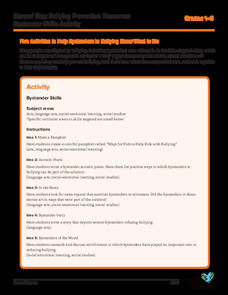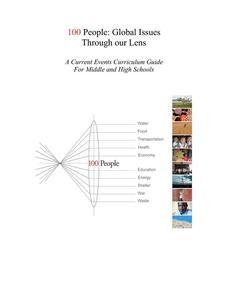Civil War Trust
Uncle Tom's Cabin
Through a careful reading and examination of Harriet Beecher Stowe's Uncle Tom's Cabin, scholars take part in grand conversations about the novel's contents, slavery, and the impact the book had on it. Furthermore,...
Committee for Children
Five Activities to Help Bystanders to Bullying Know What to Do
Five activities covering ELA, social studies, and social and emotional learning offer bystanders tips and the courage to help individuals being bullied. Activities include writing an acrostic poem, creating a pamphlet, reading current...
Echoes & Reflections
Studying The Holocaust
While many young scholars are familiar with the Holocaust, they may not understand the specific history that led to the unprecedented atrocity. The first lesson in the unit helps teachers gauge their pupils' background knowledge. A...
Echoes & Reflections
Contemporary Antisemitism
Despite the recognized atrocities of the Holocaust, anti-semitism continues. The 11th and final installment of the Teaching the Holocaust series explores the long-term effects of the Holocaust on modern anti-semitism, asking pupils to...
PBS
An Attack on Syria- What Would You Do?
Has United States military intervention in the conflicts of other countries always been warranted? After reviewing a brief background on contemporary US conflicts and reading articles describing the civil war in Syria, your learners...
Echoes & Reflections
Nazi Germany
The Holocaust was an evolution of anti-Semitism, scapegoating, and targeted violence against Jews with Nazi policies. A resource unpacks the escalation in violence, along with the erosion of democratic institutions, during the 1930s....
100 People Foundation
100 People: Global Issues Through Our Lens
If the world were 100 people...17 would not have access to safe drinking water, 18 would not be able to read or write, and 52 would not have a primary education. Using the theme of "100 people," this resource explores other major issues...
Constitutional Rights Foundation
Conducting a Panel Discussion and Civil Conversation
The final lesson in an 11-session study of immigration asks class members to engage in either a panel discussion or a civil conversation of the controversial legal and policy issues they have investigated as part of the unit.
The New York Times
The One-Question Interview
Generate interest in current events, the theme of a new unit, or a research project. Individuals select a question from the list generated by the class, conduct one-on-one interviews, analyze the responses, draw conclusions based on...
Constitutional Rights Foundation
Unauthorized Immigration and the US Economy
As part of a study of immigration and the U.S. economy, class members assume the role of newspaper editors to determine which submitted letters to print on their paper's editorial page to present a balanced view of the debate.
National Woman's History Museum
Rosie the Riveter: The Embodiment of the American Woman’s Economic and Social Awakening
Critical events force change. World War II forced a change in perceptions of and attitudes toward women. When thousands of men joined the military American factories were left shorthanded. Young historians investigate how media was used...
Echoes & Reflections
The Children and Legacies Beyond the Holocaust
Using video testimony, primary source documents that detail international agreements, and structured discussions, learners consider the precarious position of children during the Holocaust and other international conflicts, and how to...
The New York Times
Kiev in Chaos: Teaching About the Crisis in Ukraine
Provide a historical context for the political unrest between Russia and Ukraine that began in late 2013. Learners review their prior knowledge and chronicle new understandings with a KWL chart, watch a video explaining the Ukrainian...
Constitutional Rights Foundation
Special Order 40
The city of Los Angeles' 1979 Special Order 40 states: "LAPD officers shall not initiate police action with the objective of discovering the alien status of a person." After reading a fact sheet that details the history of Special Order...
Stanford University
Civil Rights or Human Rights?
Young citizens consider the American civil rights movement as part of the global struggle for human rights. After using a timeline activity to learn about the major events in the civil rights movement, class members study...
Lesson Snips
Lessons from the Holocaust
Connect global examples of attempted genocide with a well-designed social studies lesson. It includes an excellent informational text with background information on the Holocaust, as well as worksheets, book report guidelines, and...
Anti-Defamation League
Exploring Solutions to Address Radical Disparity Concerns
The deaths of Michael Brown, Eric Garner, and Tamir Rice, and the protests that followed the 2014 shootings, are the focus of a current-events activity that asks class members to brainstorm and research possible strategies to address the...
Teaching Tolerance
Introducing 'The New Jim Crow'
When Jim Crow Laws ended, the intent behind them did not. Academics read "The New Jim Crow Laws" and an interview from the author to understand how racism has not ended, but rather changed over time. The lesson explains how prejudices in...
Channel Islands Film
Arlington Springs Man: Lesson Plan 4
West of the West's documentary Arlington Springs Man introduces viewers to the remarkable finds on Santa Rosa Island. Archaeologist have discovered on this small island that is part of the Channel island chain, human and pygmy mammoth...
Practical Action
Climate Change - Who's In Control?
How can both individuals and governments respond to climate change and take responsibility to reduce its effects on our environment? Here you will find three lessons filled with discussion, debate, and role-playing...
C-SPAN
Foreign Interference in U.S. Elections
With election security looming large for 2020, pupils decide what should be done to protect them from foreign interference. A series of videos, including interviews with national security officials, elected representatives, and experts...
Carolina K-12
NATO: After the Cold War
Why was the North Atlantic Treaty Organization (NATO) formed, and what is its mission? Learners discuss NATO's participation in various events throughout the Cold War and work in groups to analyze whether those responses were appropriate.
iCivics
Mini Lesson: Supreme Court Opinions
The court of last resort. Historians research, using current cases and issues, the impact the Supreme Court of the United States has on how our nation operates. They analyze recent decisions made by the nine judges and determine how the...
Scholastic
Dear Miss Breed
This compelling plan based on the letters in the book Dear Miss Breed engages readers in learning what it was like for Japanese Americans following the attacks at Pearl Harbor. After reading the letters, young scholars will...

























